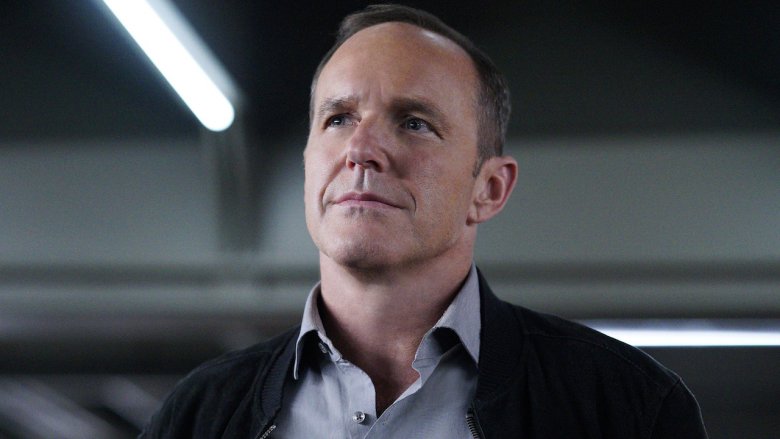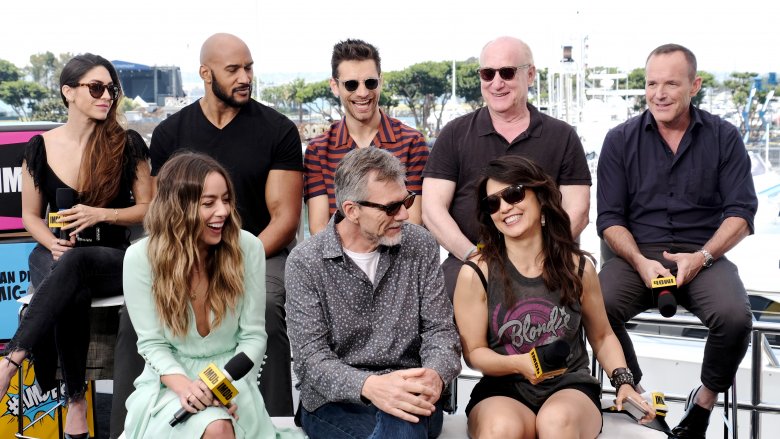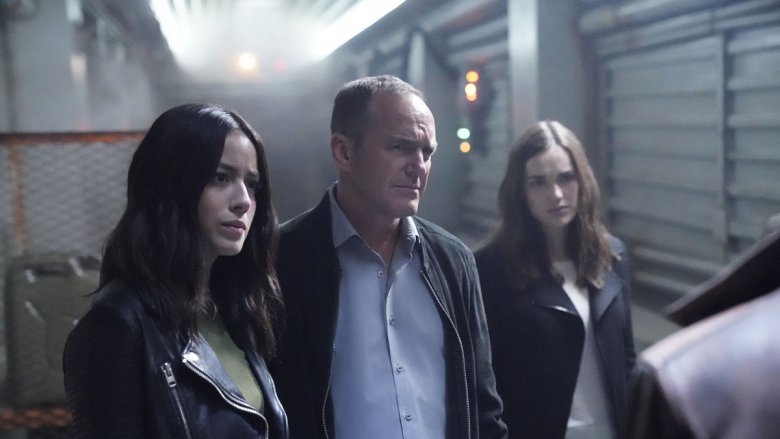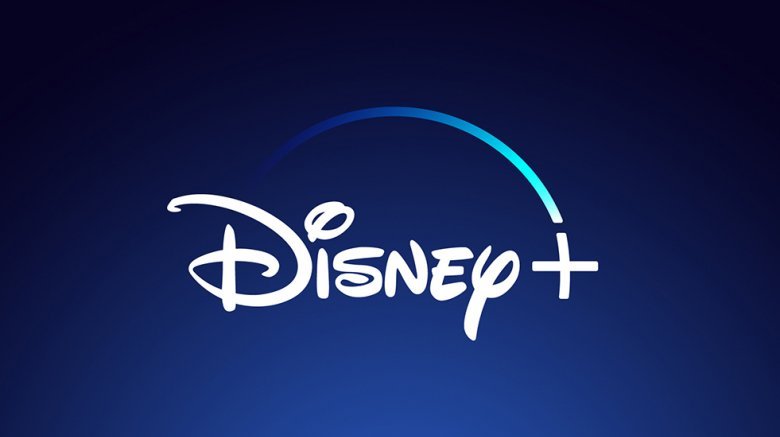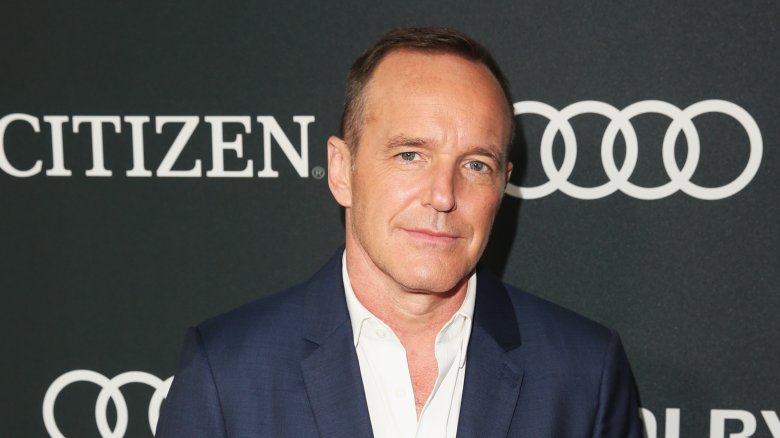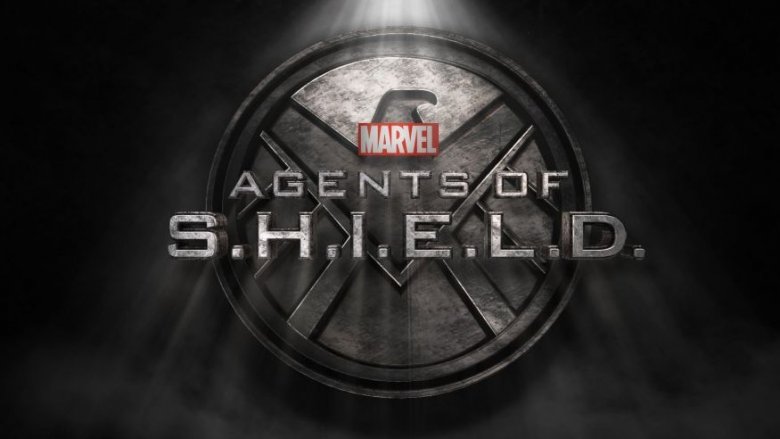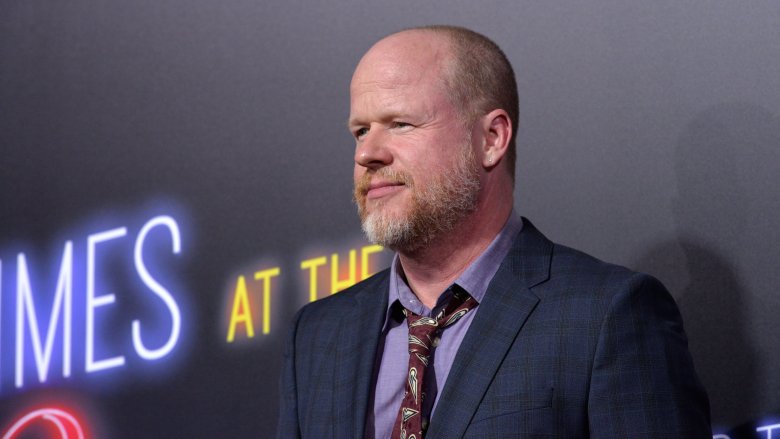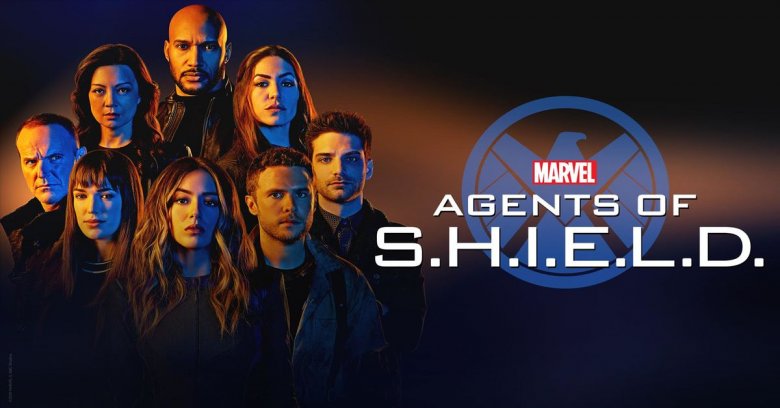The Real Reason Marvel's Agents Of S.H.I.E.L.D. Is Ending
Agents of S.H.I.E.L.D. is the longest-running MCU-affiliated TV series on the air, and it's been sating the eternal appetites of the MCU's most die-hard fans between film releases since 2013. However, an announcement came down from Marvel TV in summer 2019 that the seventh season of the series — planned for release sometime in 2020 — will be its last, signaling the further death of third-party released MCU television series, much like the deaths of Daredevil, Luke Cage, and Jessica Jones.
Though it has its own dedicated fanbase (including over 26,000 works of fan fiction), as the MCU enters Phase 4 and shifts its narrative dynamic, the sun appears to be setting for good on much of the content originally introduced in the post-Avengers mediascape. It's complicated, and perhaps to some fans even a little bit unfair, but once the facts are assembled, it becomes clear why the ruthless fist of executive mandate is bringing the show to a close. From pre-planned endings to behind-the-scenes drama, here are the real reasons that Marvel's Agents of S.H.I.E.L.D. is ending.
The Agents of S.H.I.E.L.D. ending was planned ahead of time
No one on a television show's production likes to know their work is ending, but it's a rare blessing when they get to plan ahead of time and tie off loose ends in a satisfying way. Such is the case for Agents of S.H.I.E.L.D. Production staff voluntarily decided to cut it off at season seven, after ABC preemptively renewed the series before season six had even finished airing. When asked by Deadline why it was coming to a close, Marvel TV head Jeph Loeb replied, "The simplest answer is so that we can end on our terms, really." He also described this pre-planned funeral as a "celebration," although we think that description rings a little hollow. Instead, we're wondering if this is an expression of stiff-upper-lip bravery in the face of Disney+'s ascension. We'll probably never know for sure, but it seems very possible.
Marvel TV has been left in the dust
Marvel TV is — or, as of now, was — a separate but commercially-joined division within Marvel Entertainment, the company that previously owned all the comic intellectual property on which the MCU makes its billions. However, Marvel Entertainment's acquisition by Disney as a subsidiary, and then its subsequent restructuring in 2015, appears to have left Marvel TV in the dust. After all, it's still under the jurisdiction of Marvel Entertainment's Ike Perlmutter, not Marvel Studio's Kevin Feige or even Disney boss Alan Horn.
Marvel Entertainment and Marvel Studios had what euphemistically could be called a parting of the ways, centered around stingy budgets and trying to get the failed Inhumans off the ground. So while Perlmutter and Marvel Entertainment got the TV shows, Feige and Marvel Studios got complete creative control over the films, and that's changed, well, everything. The Marvel Cinematic Universe is now its own thing unto itself, and with Marvel Studios separation from Marvel Entertainment, it appears more and more that the television division that had once been so ambitious is slowly being left behind and, ultimately, replaced.
Sure, Marvel TV has a whole slate of its own programming set to expand on Hulu over the next year, so the division itself is not about to die. But Agents of S.H.I.E.L.D. and its final season on ABC feels more like a throwback to the way things used to be and emblematic of Marvel TV as a whole, tethered to but ignored by its big brother, Marvel Studios.
Disney+ is a big problem for Agents of S.H.I.E.L.D.
While shows like Agents of S.H.I.E.L.D., Jessica Jones, and Daredevil were all produced by Marvel Television, it looks like Marvel Studios has decided to get into the TV game. Kevin Feige recently announced that in Phase 4 of the MCU, there will be a whole new slate of TV shows released on Disney+, including Loki, The Falcon and the Winter Soldier, and WandaVision. And this move to Disney+ is putting Marvel Television in quite a bind.
After all, the Marvel Studios/Disney+ shows are going to be more like smaller-scale films, complete with that bottomless Disney budget and major stars like Tom Hiddleston, Elizabeth Olsen, and Jeremy Renner. Plus, they're based on super successful movies, so it makes sense that Disney would want to emphasize these prestige projects over shows like Agents of S.H.I.E.L.D. And really, it's no coincidence that series such as Luke Cage, Legion, and S.H.I.E.L.D. have all been cancelled at around the same time.
For the moment, it's unknown if S.H.I.E.L.D. — or any other former Marvel TV shows for that matter — will be available on the Disney+ streaming service. However, Disney's ever-encroaching grasp does have significant ownership stake in Hulu, which ABC uses as a DVR streaming platform, so perhaps in the long run it doesn't matter all that much. Residuals are residuals.
Crossovers have always been a challenge
Studio films and television shows operate on wildly different production schedules, and they're presented in their own cycle of seasons. Traditional television is for the fall and winter, when everyone is home after school and work. Film is for summer blockbusters. Television takes breaks for the holidays, whereas people go to the movies on Thanksgiving and Christmas as part of family gatherings. This makes it extraordinarily difficult to align what you may want to be an all-encompassing narrative, if not impossible.
For example, time and availability constraints prohibited Emily VanCamp from appearing as Agent 13 during the critical S.H.I.E.L.D. collapse storyline in Agents of S.H.I.E.L.D. season two, meant to be entwined with the release of Captain America: The Winter Soldier. While Samuel L. Jackson did show up as Nick Fury, the show has mostly only been able to muster up cameos from secondary film characters, like Lady Sif (Jaimie Alexander) and Agent Maria Hill (Cobie Smulders).
Beyond that, there hasn't been much more than simple name-drops of film-related events and people for flavor. On the flip side, nothing that originated on Agents of S.H.I.E.L.D. has ever been given enough credence for even a footnote in one of the films. Executive producers of both Marvel TV division and Marvel Studios, as well as Agents of S.H.I.E.L.D. executive producer Joss Whedon himself, have cited the difficulty in providing meaningful crossover that wouldn't feel cheap or spoil film plots.
The show almost ended before
This isn't the first time that Agents of S.H.I.E.L.D. has faced the ax. ABC actually wanted to cancel the show after season four, but Disney intervened. So it makes sense that the production staff went into season five fully expecting not to be renewed beyond 2015. They even entitled the season finale "The End" and included a plot twist that killed off Clark Gregg's character, Phil Coulson, a fan favorite and the strongest tie back to the MCU films. ABC's renewal for season six came as a surprise to everyone (though with a shorter episode order), and the season seven announcement even more so because the network approved it before season six had even started airing.
This is a natural inconvenience of being a television show that's "on the bubble" of potential cancellation between seasons, but it rarely plays out in the show's favor as it did for Agents of S.H.I.E.L.D. That can lead to some pretty creative hoop-jumping to scramble for a story you never intended to continue. For example, Coulson was revived as a shape-shifting alien that looks like Coulson in season six, since Gregg's character is a major, first-billed star and the only true, consistent thread tying the show to the movies. He can't quite stay dead, but he can become a body-double antagonist!
It has never done well by the numbers
Agents of S.H.I.E.L.D. started off with strong Nielsen ratings in 2013, but they quickly fell off. Ever since then, it hasn't really done well insofar as traditional live audiences go. The show has always performed better in later DVR viewing, but that doesn't necessarily keep a production afloat, either. Some of that can be blamed on lost interest over time, and some on the questionable move from Tuesday to a Friday slot for the fifth season — quite possibly the worst night to be on when you want to be must-see television. Despite the challenges, S.H.I.E.L.D. is nonetheless generally well-regarded by viewers who do tune in.
Not to be deterred by critical and corporate naysaying, the show does enjoy a loyal fanbase. It might be smaller than your average fandom, but the show's supporters make themselves known on Twitter through #AgentsofShield. And there's no doubting they'll continue watching old episodes and crafting their own fan fiction adventures for the team into perpetuity.
Agents of S.H.I.E.L.D. is a product of the Whedon era
Joss Whedon is one of the original creators of Agents of S.H.I.E.L.D., and he's still credited as an executive producer. The show began in the wake of the huge success of The Avengers, and back then, Whedon was more than just the director of the film. This guy was the creative helmsman tasked with keeping the MCU together. That began to change in 2015 after Whedon's self-described struggle in making Avengers: Age of Ultron and his subsequent fallout with Marvel Studios brass. Enter the Russo brothers, who at the time were better known simply as the celebrated director team of Captain America: The Winter Soldier. They eventually took over Whedon's place later in 2015.
In the end, it seems Agents of S.H.I.E.L.D. will be a fatality of all this change and shifting corporate priority. It's the last bastion of an eroded master plan abandoned by its author. That's not the show's fault, and it's arguably not fair to a whole bunch of people who worked very hard for ultimately no cinematic recognition, but now that the Whedon era is over, Agents of S.H.I.E.L.D. is being left behind.
Marvel's Agents of S.H.I.E.L.D. is leaving a rich legacy
Agents of S.H.I.E.L.D.'s creative staff and fans alike can be satisfied and proud as the show comes to a close, even if it brings sorrow. Not every television show gets to enjoy seven seasons. None of its other Marvel TV kin did, and all of them were cut off before they could be given a chance to close the door themselves. S.H.I.E.L.D. also can claim the unique achievement and perspective bringing many MCU fans together to enjoy smaller stakes and the lives of non-powered people in a very chaotic universe. It provided a genuine prototype for the Disney+ shows coming soon, because they're also going to be about smaller worlds and more humanized challenges. (Take Hawkeye, for example.)
The greatest achievement of all is that, unassisted by its parent media company, Agents of S.H.I.E.L.D. did make a real go of weaving a whole universe for regular people existing within the MCU. The creators never received much more or earlier information about the films than audiences did, but they spun several golden subplots out of it for nothing more than their own (and fans') satisfaction. It became its own independent sci-fi genre show without the help of the MCU, and to some, it's genuinely better that way.
